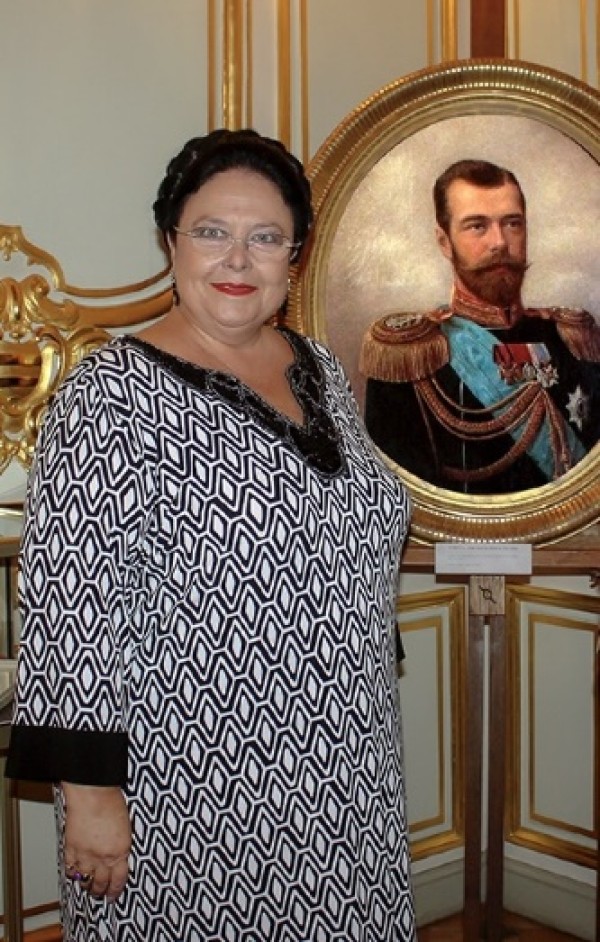An interview with the Head of the Russian Imperial House of the Romanovs, H.I.H. The Grand Duchess Maria of Russia, with Dmitry Tolkachev, correspondent for the newspaper Vecherniaia Moskva.
-Your Imperial Highness, how would you characterize Nicholas II as a person?
-I venerate Emperor Nicholas II as a holy martyr and passion-bearer. I believe that he is an intercessor before God for the peoples of Russia and of all the nations that were formerly part of the Russian Empire. I consider him to have been an outstanding ruler, who sought to preserve the heritage of his country while at the same time standing on the threshold of Russia’s most important processes of reform and modernization. I have the deepest respect for his moral character, broad education, cultured upbringing, and sense of restraint.
-How did people who knew him best think of him?
-You encounter a range of views on him, both positive and negative, in the memoirs and other historical sources that survive. Some see his restraint as indifference or indecision, his sensitivity as hypocrisy, his firm adherence to ideals and principles as stubbornness, and so on. Of course, Nicholas II, like any person and ruler, had personal shortcomings, not just virtues. But often his critics simply fall into a common temptation: to judge others by their own behavior. And they see in him what they felt and see in themselves. But those who got to know the sovereign best and most intimately saw that he was a man with a huge heart, a caring and compassionate man, a man of enormous integrity.
-How significant a personality was he in Russian history?
The fate of Nicholas II is inseparable both from the achievements of the Russian Empire at the beginning of the 20th century and its collapse in 1917. These were events of a global scale, and the personality of the Emperor was itself of a scale quite commensurate with his times and challenges. Attempts to attack his memory, to minimize the significance of his efforts and achievements—indeed, his martyrdom—are deeply unjust.
But one really cannot agree with those who, perhaps with the best of intentions, proclaim that the Emperor was always and in everything infallible. It is an extreme point of view that makes it difficult to understand our past accurately.
In its proclamation canonizing Nicholas II and members of his family as saints, the Russian Orthodox Church noted that this glorification does not signify an unconditional idealization of the Emperor and his policies. And the Emperor himself was far from thinking that he was always and in all things right. No saint holds such an unqualified positive view of himself. Saintliness does not presuppose sinlessness, but rather humility and the capacity to repent. The greatness of the Holy Passion-Bearer Emperor Nicholas II lies, first and foremost, in his deep faith and self-sacrifice for the sake of his country.
-What spiritual and political legacy did he leave behind?
-Emperor Nicholas II left us an example of a ruler who, not in words but in deeds, strove to be the father of his people. He is often reproached for loving his family too much and consequently neglecting, so it is claimed, the interests of the nation. In my opinion, this is a wrong impression. All the people of his country were his family. He truly was an exemplary family man. Even his harshest critics do not deny this. But when the final, fateful moment of choice came, the Emperor knowingly decided to sacrifice himself and his own family, if only at least to try to prevent a fratricidal civil war from breaking out. His decision was not an act of weakness, as some believe, but, on the contrary, one of strength and courage. That strength and courage were the same as that which stood at the very beginning of Russia’s holiness—with the princes Boris and Gleb, who preferred to suffer and die in order to save the lives of their countrymen.
-How might Russian history have developed if such tragic events had never happened?
-History doesn’t really countenance the subjunctive mood. You can look at individual events, think about the nuances, consider the continuity (and discontinuity) of certain phenomena.... And you can certainly speculate that, if some events had happened differently, things might have turned out differently. But the general course of history is dependent on so many determining and complex factors that it is simply pointless to talk about some kind of “alternative history.” Our country had to go through the revolution and the civil war, and through all the subsequent events of the terrible and complex twentieth century. Responsibility for this lies not only with the revolutionaries and foreign enemies of Russia, but also with the Imperial House, and with the aristocracy, with a significant part of the clergy, and with industrialists and entrepreneurs.... And of course the Emperor himself, by definition, takes responsibility for everything that happens in his country.
No one can change the past. So we should first and foremost search in the past for what is good, not what is bad, and, in the present, search for those things that bring us together, not divide us. And such was the injunction given us by Nicholas II, transmitted for him from confinement shortly before his execution by his daughter, Grand Duchess Olga: “Father asks me to convey to everyone who has remained loyal to him, and to those who still have some influence, not to avenge him. He has forgiven everyone and prays for everyone; and not to take revenge for their own sakes, but to remember that the evil that is now in the world will become yet more powerful, and that evil cannot ever be defeated by evil, only by love.”
Published in Vecherniaia Moskva, 18-25 May, № 19 (294250).

